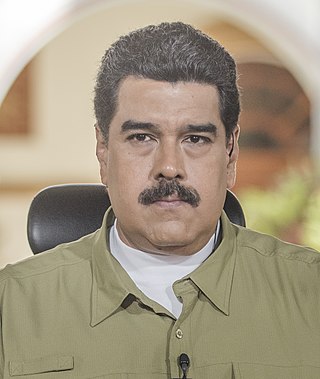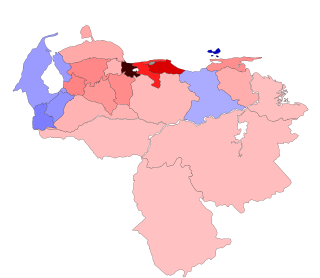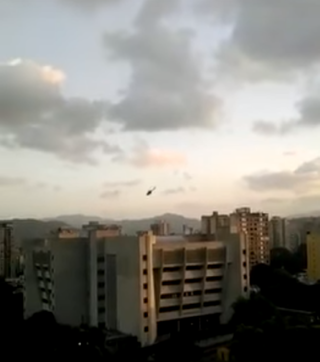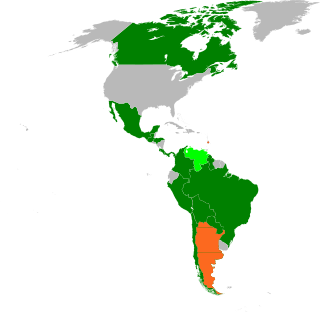
The National Assembly is the legislature for Venezuela that was first elected in 2000. It is a unicameral body made up of a variable number of members, who were elected by a "universal, direct, personal, and secret" vote partly by direct election in state-based voting districts, and partly on a state-based party-list proportional representation system. The number of seats is constant, each state and the Capital district elected three representatives plus the result of dividing the state population by 1.1% of the total population of the country. Three seats are reserved for representatives of Venezuela's indigenous peoples and elected separately by all citizens, not just those with indigenous backgrounds. For the 2010 to 2015 the number of seats was 165. All deputies serve five-year terms. The National Assembly meets in the Federal Legislative Palace in Venezuela's capital, Caracas.

The Supreme Justice Tribunal is the highest court of law in the Bolivarian Republic of Venezuela and is the head of the judicial branch. As the independence of the Venezuelan judiciary under the regime of Nicolás Maduro is questioned, there have recently been many disputes as to whether this court is legitimate.

Nicolás Maduro Moros is a Venezuelan politician who has served as the president of Venezuela since 2013.

Tibisay Lucena Ramírez was a Venezuelan politician, president of the National Electoral Council (CNE) between 2006 and 2020, one of the five branches of government of Venezuela. Since 2017, Lucena was sanctioned by several countries for her role in undermining democracy and human rights in the country.

On 14 April 2013 Nicolás Maduro was elected President of Venezuela, narrowly defeating opposition candidate Henrique Capriles with just 1.5% of the vote separating the two candidates. Capriles immediately demanded a recount, refusing to recognize the outcome as valid. Maduro was later formally inaugurated as President on 19 April, after the election commission had promised a full audit of the election results. On 24 October 2013, he announced the creation of a new agency, the Vice Ministry of Supreme Happiness, to coordinate all the social programmes.

Presidential elections were held in Venezuela on 20 May 2018, with incumbent Nicolás Maduro being declared re-elected for a second six-year term. The original electoral date was scheduled for December 2018 but was subsequently pulled ahead to 22 April before being pushed back to 20 May. Some analysts described the poll as a sham election, with the elections having the lowest voter turnout in the country's democratic era.

Regional elections were held in Venezuela on 15 October 2017 to elect the executive position of all 23 federal entities. This marked the first state executive election not held on the same date as elections for state legislatures, and the second separate from municipal elections. They were the 9th regional elections held in Venezuela since 1989.

The 2017 Venezuelan protests began in late January following the abandonment of Vatican-backed dialogue between the Bolivarian government and the opposition. The series of protests originally began in February 2014 when hundreds of thousands of Venezuelans protested due to high levels of criminal violence, inflation, and chronic scarcity of basic goods because of policies created by the Venezuelan government though the size of protests had decreased since 2014. Following the 2017 Venezuelan constitutional crisis, protests began to increase greatly throughout Venezuela.

On 29 March 2017, the Supreme Tribunal of Justice (TSJ) of Venezuela took over legislative powers of the National Assembly. The Tribunal, mainly supporters of President Nicolás Maduro, also restricted the immunity granted to the Assembly's members, who mostly belonged to the opposition.

The 2017 Venezuelan protests were a series of protests occurring throughout Venezuela. Protests began in January 2017 after the arrest of multiple opposition leaders and the cancellation of dialogue between the opposition and Nicolás Maduro's government.

On 27 June 2017, there was an incident involving a police helicopter at the Supreme Tribunal of Justice (TSJ) and Interior Ministry in Caracas, Venezuela. Claiming to be a part of an anti-government coalition of military, police and civilians, the occupants of the helicopter allegedly launched several grenades and fired at the building, although no one was injured or killed. President Nicolás Maduro called the incident a "terrorist attack". The helicopter escaped and was found the next day in a rural area. On 15 January 2018, Óscar Pérez, the pilot and instigator of the incident, was killed during a military raid by the Venezuelan army that was met with accusations of extrajudicial killing.

A referendum was held in Venezuela on 16 July 2017. The referendum was called by the National Assembly in response to the constitutional crisis and President Nicolás Maduro's plans for a Constituent Assembly. The referendum was an act of civil disobedience in the context of the application of Articles 333 and 350 of the Venezuelan constitution, with the articles calling for Venezuelans to "disown any regime ... that violates democratic values", especially since the National Electoral Council and the Supreme Tribunal of Justice were not recognized in the referendum. The opposition Democratic Unity Roundtable (MUD) announced that there would be 2,030 areas for the popular consultation nationwide to serve more than 19 million voters.

The Constituent National Assembly was a constituent assembly elected in 2017 to draft a new constitution for Venezuela. Its members were elected in a special 2017 election that was condemned by over forty mostly Latin American and Western states. The Democratic Unity Roundtable—the opposition to the incumbent ruling party—also boycotted the election claiming that the Constituent Assembly was "a trick to keep [the incumbent ruling party] in power." Since the opposition did not participate in the election, the incumbent Great Patriotic Pole, dominated by the United Socialist Party of Venezuela, won almost all seats in the assembly by default.

The Lima Group is a multilateral body that was established following the Lima Declaration on 8 August 2017 in the Peruvian capital of Lima, where representatives of 12 countries met in order to establish a peaceful exit to the ongoing crisis in Venezuela.
Parliamentary elections were held in Venezuela on 6 December 2020. Aside from the 167 deputies of the National Assembly who are eligible to be re-elected, the new National Electoral Council president announced that the assembly would increase by 110 seats, for a total of 277 deputies to be elected.
The Supreme Tribunal of Justice of Venezuela (TSJ) in exile is an institution that some, including the Organization of American States, consider to be the legitimate highest court of law in Venezuela and the head of the judicial branch, as opposed to the Supreme Tribunal of Justice. It was established on 21 July 2017 following the 2017 Venezuelan constitutional crisis. The TSJ's 33 members have been based in Chile, Colombia, Panama, and the United States due to the political crisis in Venezuela.
Nicolás Maduro, incumbent President of Venezuela since 2013 and successor of Hugo Chávez, was officially nominated for re-election as the presidential candidate of the Great Patriotic Pole (GPP) on 4 February 2018.

Luis Eduardo Parra Rivero is a Venezuelan politician who was in a dispute with Juan Guaidó for a year over who was the President of the National Assembly of Venezuela based on a vote on 5 January 2020.
Indira Maira Alfonzo Izaguirre is a Venezuelan judge who until May 2020 served as the first vice president of the Supreme Tribunal of Justice of Venezuela (TSJ) and as president of the Electoral Chamber. In June 2020, she sworn in as chief rector and president of the National Electoral Council (CNE) by the TSJ, to organize 2020 Venezuelan parliamentary election. Her position in the CNE is contested by the National Assembly, organism in charge of selecting the CNE members, but the parliament was deemed in “unconstitutional omission” by the TSJ.

Regional and municipal elections were held in Venezuela on 21 November 2021. In the elections, all executive and legislative positions of the 23 federal entities, as well as that of the 335 municipalities of the country, were renewed.






















